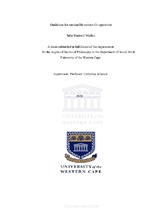| dc.description.abstract | The number of women joining the formal waged labour market has been visibly increasing since the 1950s to become half of the employees in the developed economies (McAdam & Marlow, 2010; OECD, 2003). Women entrepreneurship has also been growing globally. According to literature, since 2006, there is an estimated 7.7 million majority of women-owned businesses and a further 2.7 million joint-owned other businesses in the United States of America (Weeks, 2016). Literature also indicates that the gender gap is narrowing, and many changes have been identified relating to the status of women and the conditions under which women live (Commission of Gender SA, 2007).
Measures have been put together by governments, and civil society to address challenges facing women and these measures include, amongst others, funding for women and starting co-operatives as a vehicle to job creation and poverty alleviation. It has been reported that in South Africa, most of the newly established co-operatives are registered by black women in townships and the rural areas (DTI, 2012). Despite the support from the South African government, the co-operatives are reported to have a low survival rate.
The aim of this research was to develop guidelines for sustainable women co-operatives using a multiple case study. The Department of Small Business Development (DSBD) is the custodian of all the activities of co-operatives within government and has several agreements with other government departments. However, it was difficult to get the information on how many government departments are having an agreement with the DSBD and the nature of the agreement. Purposive sampling was applied in selecting government directors and fifteen co-operatives interviewed.
The study was implemented in two phases. The first phase was Data Collection, which comprised of three stages:
Stage one - scoping review of the co-operatives,
Stage two - interviews with the directors responsible for co-operatives in the government departments and government agencies mentioned above,
Stage three - seven focus groups consisting of a minimum of three members were conducted. In-depth interviews were conducted with the remaining eight co-operatives. Not all members of the selected co-operatives were available during the visit due to various reasons which included, operational requirements, training, illness and other reasons which were not disclosed.
Phase two involved developing the guidelines for sustainable women co-operatives.
The interview with the fifteen selected co-operatives was carried out in the four provinces of Gauteng, Free State, Limpopo and Mpumalanga. The four co-operatives based in Mpumalanga that were recommended for inclusion by SEDA; were already visited and interviewed by the SEDA researchers in 2016. The data were analysed individually first, and then a cross-case analysis was applied (Khan & Van Wynsberghe, 2008). The cross-case analysis was done to enable the researcher to highlight common and different factors in events, activities and processes as well as to assist the researcher to form a strong opinion on which elements contributed to the success of the selected co-operatives.
Confidentiality of the participants was maintained by identifying the co-operatives alphabetically from A to O. The responses from the directors of government departments were also presented as Organisation A up to H.
The guidelines drawn were presented to the panel of experts for their input.
Key elements emanating from the results were used to formulate the guidelines and are:
1) improved relationships where co-operatives should be formed by people who have either worked together before or had known each other before; 2) the size of co-operative should be considered in order to minimise the possibilities of in-fighting; 3) training to be customised 4) mentorship should be available to strengthen co-operative`s development; 5) co-operatives needed sector related information upon start-up; 6) ethical values of passion, respect for each other, perseverance and trust for each other should be shared by all; 7) financial support required from relevant stakeholders; 8) co-operatives needed access to
markets for their products/ services; 9) good governance to be maintained for accountability; 10) all the co-operatives, new and old, should undertake training on the importance of organisational structure and be assisted in designing their organisational structures; 11) keeping the information about the co-operatives updated will make it easy for potential assistance to reach co-operatives; 12) a strong national apex body needed to be the real voice of the co-operatives.
The study makes a strong recommendation for the establishment of the Co-operative Development Agency as stipulated by the Co-operative Amendment Act No. 6 of 2013. | en_US |

